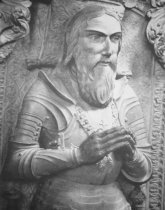|
Ludwig II. Duke Eberhard with the Beard (Ludwig's younger brother) 
German Epilepsy Museum Kork www.epilepsiemuseum.de |
During his life, Duke Ludwig of Württemberg was by no means a prominent figure, and he probably would have remained an obscure historical character had he not had epilepsy. When Ludwig I of Württemberg died in 1450, he left two sons who had not come of age: Ludwig and Eberhard. The elder Ludwig was prevented from inheriting the dukedom because of a "serious infirmity", and his younger brother Eberhard (who became known as "Duke Eberhard with the Beard") took over the ducal governmental duties - under a guardian at first until he reached his majority. Eberhard's elder brother, Duke Ludwig II, had been mentally retarded since early childhood and clearly suffered from the falling sickness. |

 At the end of the Middle Ages, epilepsy was regarded as a "demonic illness" caused by evil spirits or the devil. Patients and their families therefore did not go to physicians for advice and treatment (they did not have any effective cure for it anyway), but sought help from the church, from God and the saints.
At the end of the Middle Ages, epilepsy was regarded as a "demonic illness" caused by evil spirits or the devil. Patients and their families therefore did not go to physicians for advice and treatment (they did not have any effective cure for it anyway), but sought help from the church, from God and the saints.

